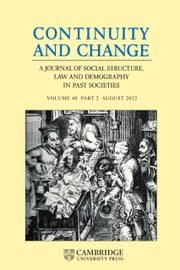Article contents
‘Classified at random by veritable illiterates’: the taking of the Spanish census of 1920 in Guipúzcoa province
Published online by Cambridge University Press: 24 August 2005
Abstract
This article offers an approach through administrative and cultural history to the problems associated with gathering and processing data for the Spanish national census of 1920, and by implication for earlier Spanish censuses. It focuses on the Basque province of Guipúzcoa, making use of correspondence between the central statistical office in Madrid, the provincial jefe de estadística and the localities, and of reports on three problematic towns within the province. The issues that emerge regarding ‘undercounting’, the definition of administrative boundaries and the classification of demographic characteristics are set in the wider context of census-taking practices and problems elsewhere in Spain and in other cultures.
- Type
- Research Article
- Information
- Copyright
- © 2005 Cambridge University Press
- 1
- Cited by


